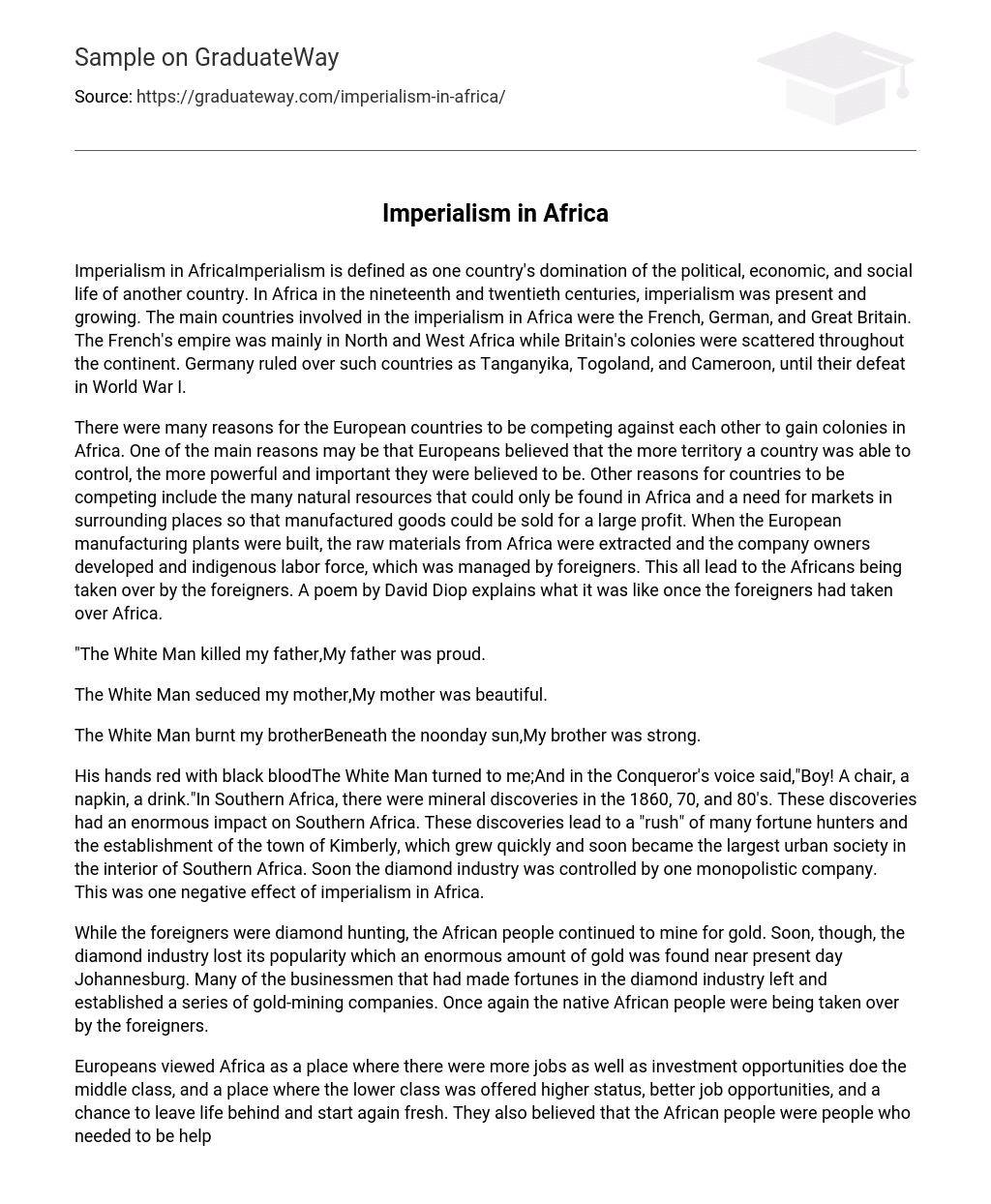Imperialism in AfricaImperialism is defined as one country’s domination of the political, economic, and social life of another country. In Africa in the nineteenth and twentieth centuries, imperialism was present and growing. The main countries involved in the imperialism in Africa were the French, German, and Great Britain. The French’s empire was mainly in North and West Africa while Britain’s colonies were scattered throughout the continent. Germany ruled over such countries as Tanganyika, Togoland, and Cameroon, until their defeat in World War I.
There were many reasons for the European countries to be competing against each other to gain colonies in Africa. One of the main reasons may be that Europeans believed that the more territory a country was able to control, the more powerful and important they were believed to be. Other reasons for countries to be competing include the many natural resources that could only be found in Africa and a need for markets in surrounding places so that manufactured goods could be sold for a large profit. When the European manufacturing plants were built, the raw materials from Africa were extracted and the company owners developed and indigenous labor force, which was managed by foreigners. This all lead to the Africans being taken over by the foreigners. A poem by David Diop explains what it was like once the foreigners had taken over Africa.
“The White Man killed my father,My father was proud.
The White Man seduced my mother,My mother was beautiful.
The White Man burnt my brotherBeneath the noonday sun,My brother was strong.
His hands red with black bloodThe White Man turned to me;And in the Conqueror’s voice said,”Boy! A chair, a napkin, a drink.”In Southern Africa, there were mineral discoveries in the 1860, 70, and 80’s. These discoveries had an enormous impact on Southern Africa. These discoveries lead to a “rush” of many fortune hunters and the establishment of the town of Kimberly, which grew quickly and soon became the largest urban society in the interior of Southern Africa. Soon the diamond industry was controlled by one monopolistic company. This was one negative effect of imperialism in Africa.
While the foreigners were diamond hunting, the African people continued to mine for gold. Soon, though, the diamond industry lost its popularity which an enormous amount of gold was found near present day Johannesburg. Many of the businessmen that had made fortunes in the diamond industry left and established a series of gold-mining companies. Once again the native African people were being taken over by the foreigners.
Europeans viewed Africa as a place where there were more jobs as well as investment opportunities doe the middle class, and a place where the lower class was offered higher status, better job opportunities, and a chance to leave life behind and start again fresh. They also believed that the African people were people who needed to be helped so the Europeans went over on various church missions. Rudyard Kipling’s poem, “White Man’s Burden,” captures the mentality of the Europeans:”Take up the White Man’s burdenSend out the best ye breedGo bind your sons to exile,To serve your captive’s need;To wait in heavy harness,On fluttered folk and wildYour new-caught sullen peoples,Half devil and half child.”Not all Europeans felt the need to “save” the Africans. Cecil Rhodes was a British born imperialist who had established the diamond company that controlled 90 percent of the world’s diamond production. He abided heavily by laissez faire capitalism and British superiority. Although not thinking of the African nation as needing to be changed, he looked at everything a different way. A quote from him explains that he, although not like the others, still believed that African nations were there to be taken over and used for their resources by higher and more superior countries.
“Africa is still lying ready for us. It is our duty to take it. It is our duty to seize every opportunity of acquiring more territory and we should keep this one idea steadily before our eyes that more territory simply means more of the Anglo-Saxon race more of the best the most human, most honorable race the world possesses”Not only negative came out of the Europeans coming into African and colonizing. It could be argued that it was good for the Africans to get more civilized and see what industry is like. Mostly, though, there was a lot of negative. The Africans were forced to be avid participants in the imperialism that took place in Africa, and because of lack of weapons, there was no way to defeat the foreigners and win back the areas that they originally ruled. A quote by John Hobson, a British reformer and economist, sums up the period of Imperialism in Africa quite well.
“The decades of Imperialism have been prolific in wars; most of these wars have been directly motivated by aggression of white races upon “lower races,” and have issued in the forcible seizure of territory. Every one of the steps of expansion in Africa, Asia and the Pacific has been accompanied by bloodshed; each imperialist power keeps an increasing army available for foreign service; rectification of frontiers, punitive expeditions, and other euphemisms for war are incessant progressThe condition of the white rulers of these lower races is distinctively parasitic; they live upon those native, their chief work being that of organizing native labor for their support”The Europeans played part in making the native of Africa a horrible and gruesome time, filled with wars, bloodshed, and poverty. This was a truly negative times because it is obvious that the negative outweighs the positive of the imperialism in Africa.





